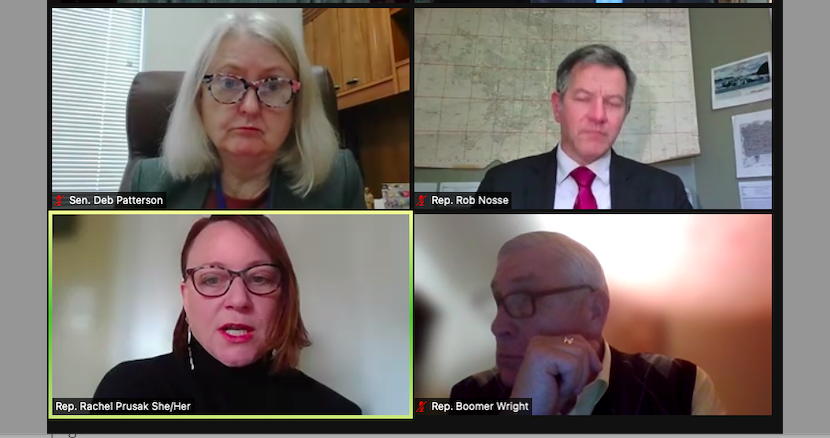
Oregon’s health care policy landscape has shifted dramatically in two years, as the COVID-19 pandemic has laid bare vulnerabilities in the system including its frayed workforce, inequities and limited residential behavioral health care facilities.
The shift has renewed state lawmakers’ focus on public health, its modernization and how the state can do better when the next pandemic emerges, several of them reflected on Thursday in a virtual panel discussion. They also gave a preview of what Oregonians can expect as the Legislature meets in February for a five-week short session in Salem. The online event had 138 attendees and was organized by the Oregon Health Forum, a sister organization of The Lund Report.
“We all know COVID-19 highlighted strengths and weaknesses of our health care systems,” said Rep. Rachel Prusak, D-Tualatin/West Linn and chair of the House Health Care Committee.
Rep. Rob Nosse, D-Portland and chair of the joint budget committee’s subcommittee for human services, said he will support a bill, for the third time, that will try to improve pay parity for naturopathic physicians. Currently, naturopaths are compensated at about 60% of other physicians in commercial health insurance plans, Nosse said, adding that needs to be turned around.
Nosse also has a bill that would help behavioral health providers recruit and retain employees, providing funding for raises, bonuses and child care stipends. That bill will allow providers to apply for loans, which are forgivable if they demonstrate they used the funding for its intended purpose.
Prusak, also a nurse practitioner, has a bill intended to bolster Oregon’s nurse workforce in hospitals, long-term care facilities and other settings.
Rep. Boomer Wright, R-Coos Bay, said he’s sponsoring a bill that is intended to give parents an avenue for teenage children to get life-saving medical care after children refuse treatment. He stressed it’s not intended to take away rights of children, just ensure they get the care they need during a medical crisis.
Sen. Dick Anderson, R-Lincoln City, said the state needs more financial accountability with a focus on results.
“Before we start putting more money into programs, I like to know where it went before and ‘How did things work out?’” Anderson said, noting that the state ranks low nationwide in areas like education and behavioral health, despite deep investments.
“We need to see results appropriate with the funding,” he said.
State lawmakers agreed that long-term solutions are needed beyond the work of the session. For example, the state’s behavioral health providers need a long-term solution that goes beyond short-term incentives for workers.
That work will include looking at reimbursement rates for providers, which lawmakers say short-changes workers who lack adequate salaries.
“It’s kind of a vicious cycle,” Nosse said.
Sen. Deb Patterson, D-Salem and chair of the Senate Health Care Committee, said she will have a bill that will develop an online registry of homecare workers so consumers can research them.
Asked about lessons learned from the pandemic, lawmakers acknowledged the state was not prepared for the public health emergency.
Prusak said the state has to invest in public health. Prusak also highlighted steps the state could have done differently before the current surge to protect patients in long-term care settings, such as reinstate N-95 mask use and make sure vaccine booster shots are easy to obtain.
Anderson said the state was not able and “continues to struggle” with delivery of necessary services, whether it’s rental assistance or unemployment.Patterson said the pandemic is a case study in why public health is necessary.
“This is really the chickens coming home to roost,” Patterson said.
Lawmakers also are hoping to gain more insights about the pandemic and what Oregon could have done better. A bill in the session would commission an after-action report that analyzes Oregon’s response to COVID-19.
You can reach Ben Botkin at [email protected] or via Twitter @BenBotkin1.